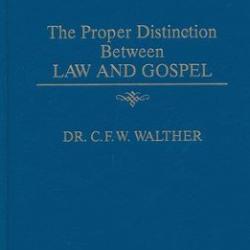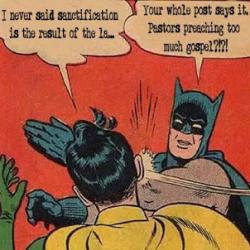There are several arguments leveled against a traditional law-gospel distinction as taught within Lutheran theology. One of those arguments surrounds the preface to the Ten Commandments. It is argued that the law and the gospel are not different words of God, because the two are expressed in conjunction with one another. The gospel is the basis for obedience to God’s law. Rich Lusk, for example, argues:
the preface to the Ten Commandments indicates the law was given as a gift to redeemed Israel, not as a platform from which they could strive to attain God’s favor. They were already saved; now God simply tells them how to live as his faithful people. (The article can be found here)
Since the law is given as a gift to an already redeemed people, rather than a lost people who needs to see the reality of their sin, the law and gospel distinction is invalid. I find this to be a rather strange argument for a couple of reasons. First, this argument really only works in a system where it is argued that the law only accuses. Traditional Lutheran, and Reformed, theology has argued that the law has three uses: as a curb, mirror, and guide. Lusk’s point that the Ten Commandments are in some sense given in a third use context, due to the nature of the preface, is correct. As Daniel Gard explains:
I propose that the Law of the Old Testament is not external to Israel as the people of God but actually constitutes their identity. It is not the Law that brought about their election nor is it the Law that transforms Israel into the people of God. Rather, the grace of God alone called Israel into being and formed this nation into his people. The Law flows into and from that reality because in, with, and through the Lord’s gracious call, the Law becomes essential to the people of Israel. The Law does not transform them into the people of God; rather, it transforms them as the people of God. [1]
The law does serve as a guide for those who have been redeemed. This much is clear in Scripture and in Lutheran theology. However, opponents of a law-gospel distinction seem to be pitting some Scripture against others. The law does not function only as a guide, but also as that which condemns, both one who is redeemed, and those who are not. The same redeemed people of Israel were sinners, and unrepentant ones. The law was used, by God, to bring them to repentance continually. A quick read of Deuteronomy 28 demonstrates that God often used the law to condemn the people, writing about such harsh punishments as the eating of one’s own children!
The second problem with this argument is that it assumes that redeemed people don’t need the second use of the law. Lusk argues that because the law was given to redeemed people, we can assume that it is given as a guide and not to condemn. The point should be rather obvious that the law serves to convict, not only unbelievers, but Christians. There are plenty examples of God’s law condemning David, Moses, Paul, and other figures who are the redeemed people of God.
The preface to the Decalogue does not in any way negate the distinction between law and gospel. It simply shows that the law functioned in all three senses in Old Testament Israel, just as it does in the church today.
[1] Gard, Daniel L, “The Law and Freedom in the Old Testament,” The Law in Holy Scripture. St. Louis: Concordia, 2004., 39












